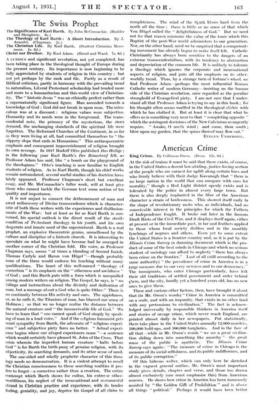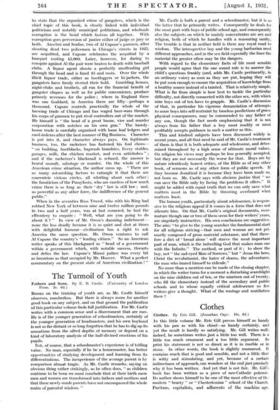American Crime
King crime. By Collinson Owen. (Bann. 12s. M.) At the risk of truism it must be said that there exists, of course, in the United States a decent law-abiding, justice-loving section of the people who are earnest for uplift along certain lines and who firmly believe with their Judge Kavanagh that " there is no large nation in the world that can compare with ours for morality," though a Red Light district openly exists and is tolerated by the police in almost every large town. But there is also deeply implanted in the fibre of the American character a strain of lawlessness. This showed itself early in the shape of revolutionary mobs who, as individuals, had no conceivable interest in the principles for which the Fathers of Independence fought. It broke out later in the famous Draft Riots of the Civil War, and it displays itself again, either at present or in the immediate past, in tar and feathers applied to those whom local society dislikes and in the monthly lynchings of negroes and others. Even yet to some 'extent the United States is a frontier country and, as it is put by the Illinois Crime Survey (a damning document which is the pro, duct of some of the best minds in Chicago and which no serious student of sociology can afford to neglect) " there has always been crime on the frontier." Last of all (still according to the same authority) " the prevalence of crime in America is in a large measure due to our very newness and to our democracy.'' The immigrants, who enter Chicago particularly, have left their old traditions of settled government and order behind them, and the city, hardly yet a hundred years old, has no new ones to give them.
These and various other factors, then, have brought it about that (in Mr. Owen's words) " Crime in America is committed on a scale, and with an impunity, that exists in no other land with any pretensions to civilization." The fact is acknow- ledged universally by responsible thinkers in America itself and stories of savage crime, which never reach England, are printed almost daily in her newspapers. Put statistically, there take place in the United States annually 12,000 murders, 100,000 hold-ups, and 500,000 burglaries. And in the face of all that—while in Mr. Owen's words " we see a great civiliza- tion sliding down into something like anarchy "—the great mass of the public is apathetic. The Illinois Crime Survey says again: "The measure of crime in Chicago is the measure of its social selfishness, and its public indifference, and of its public corruption."
Of this hideous welter, which can only here be sketched in the vaguest general outline, Mr. Owen's most important study gives details, chapter and verse, and those too drawn almost exclusively (one must emphasize this) from American sources. He shows how crime in America has been immensely assisted by " the Golden Gift of Prohibition " and is above all things " political." Perhaps it would have been better
to state that the organized crime of gangsters, which is the chief topic of this book, is closely linked with individual politicians and notably municipal politicians, and wholesale corruption is the bond which fastens all together. With corruption goes perversion of justice either of judge or jury or both. Anselmi and Scalise, two of Al Capone's gunmen, after shooting dead two policemen in Chicago's streets in 1925, are acquitted, and Capone celebrates the acquittal by a banquet costing £5,000. Later, however, for daring to conspire against Al the pair were beaten to death with baseball clubs. A liquor agent shoots a perfectly unoffending girl through the head and is fined $5 and costs. Over the whole . illicit liquor trade, either as bootleggers or hi-jackers, the gangsters have firmly riveted their hold. Gambling houses, night-clubs and brothels, all run for the financial benefit of gangster cliques as well as for public convenience, produce princely revenues for the police ; where in England there was one Goddard, in America there are fifty—perhaps a thousand. Capone controls practically the whole of the brewing trade of Chicago and has waged beer-wars through his corps of gunmen to put rival controllers out of the market. He himself is " the head of a great booze, vice and murder corporation with notches on his own gun." The bawdy- house trade is carefully organized with loose leaf ledgers and card-indexes after the best manner of Big Business. Character is put into it, and character always pays. On legitimate business, too, the racketeer has fastened his foul claws- " on building, bootblacks, bagwash laundries, livery stables, garages, milk, the chicken market, and even artichokes " ; and if the racketeer's blackmail is refused, the answer is brutal assault, sabotage or murder. On the whole of this American crime situation, the author sums up. " There are so many astonishing factors to entangle it that there are concentric vicious circles, all whirling about each other ; the fanaticism of the Pussyfoots, who are careless of how much crime there is so long as their ' dry ' law is still law ; and, as powerful as any other force, the indifference of the general public."
When in the seventies Boss Tweed, who with his Ring had robbed New York of between nine and twelve million pounds in two and a half years, was at last cornered, he had the effrontery to enquire : " Well, what are you going to do about it ? " In view of Mr. Owen's damning indictment— none the less deadly because it is so quiet and shot at times with delightful humour—civilization has a right to ask America the same question. Mr. Owen ventures to call Al Capone the country's " leading citizen." So an American
writer speaks of this blackguard as " head of a government
within a government which, with notable success, thwarts and defies the law. Capone's Miami palace was every bit as luxurious as that occupied by Mr. Hoover. What a perfect commentary on the present state of American civilization ! "



































 Previous page
Previous page